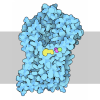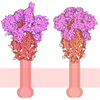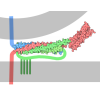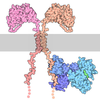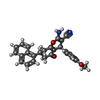[English] 日本語
 Yorodumi
Yorodumi- PDB-7awn: Structure of the thermostabilized EAAT1 cryst mutant in complex w... -
+ Open data
Open data
- Basic information
Basic information
| Entry | Database: PDB / ID: 7awn | ||||||
|---|---|---|---|---|---|---|---|
| Title | Structure of the thermostabilized EAAT1 cryst mutant in complex with rubidium and barium and the allosteric inhibitor UCPH101 | ||||||
 Components Components | Excitatory amino acid transporter 1,Neutral amino acid transporter B(0),Excitatory amino acid transporter 1 | ||||||
 Keywords Keywords | MEMBRANE PROTEIN / excitatory amino acid transporter 1 / human glutamate transporter / SLC1A3 / ion-coupling mechanism | ||||||
| Function / homology |  Function and homology information Function and homology informationDefective SLC1A3 causes episodic ataxia 6 (EA6) / Astrocytic Glutamate-Glutamine Uptake And Metabolism / cranial nerve development / glutamine secretion / gamma-aminobutyric acid biosynthetic process / neurotransmitter uptake / L-glutamine import across plasma membrane / cell morphogenesis involved in neuron differentiation / L-glutamine transmembrane transporter activity / glutamine transport ...Defective SLC1A3 causes episodic ataxia 6 (EA6) / Astrocytic Glutamate-Glutamine Uptake And Metabolism / cranial nerve development / glutamine secretion / gamma-aminobutyric acid biosynthetic process / neurotransmitter uptake / L-glutamine import across plasma membrane / cell morphogenesis involved in neuron differentiation / L-glutamine transmembrane transporter activity / glutamine transport / L-serine transmembrane transporter activity / high-affinity L-glutamate transmembrane transporter activity / glutamate:sodium symporter activity / membrane protein complex / L-glutamate import / : / L-glutamate transmembrane transporter activity / L-glutamate transmembrane transport / D-aspartate import across plasma membrane / ligand-gated channel activity / neutral amino acid transport / L-aspartate transmembrane transporter activity / L-aspartate import across plasma membrane / Glutamate Neurotransmitter Release Cycle / neutral L-amino acid transmembrane transporter activity / auditory behavior / L-glutamate import across plasma membrane / transepithelial transport / symporter activity / Amino acid transport across the plasma membrane / amino acid transmembrane transporter activity / intracellular sodium ion homeostasis / cellular response to cocaine / glutamate binding / antiporter activity / neuromuscular process controlling balance / neurotransmitter transport / RHOJ GTPase cycle / protein homotrimerization / RHOQ GTPase cycle / amino acid transport / response to light stimulus / RHOH GTPase cycle / RAC3 GTPase cycle / positive regulation of synaptic transmission / transport across blood-brain barrier / monoatomic ion transport / RAC1 GTPase cycle / potassium ion transmembrane transport / chloride transmembrane transport / basal plasma membrane / erythrocyte differentiation / sensory perception of sound / response to wounding / centriolar satellite / melanosome / signaling receptor activity / virus receptor activity / cytoplasmic vesicle / chemical synaptic transmission / neuron projection / ciliary basal body / response to xenobiotic stimulus / response to antibiotic / neuronal cell body / synapse / perinuclear region of cytoplasm / cell surface / extracellular exosome / metal ion binding / membrane / plasma membrane Similarity search - Function | ||||||
| Biological species |  Homo sapiens (human) Homo sapiens (human) | ||||||
| Method |  X-RAY DIFFRACTION / X-RAY DIFFRACTION /  SYNCHROTRON / SYNCHROTRON /  MOLECULAR REPLACEMENT / MOLECULAR REPLACEMENT /  molecular replacement / Resolution: 3.92 Å molecular replacement / Resolution: 3.92 Å | ||||||
 Authors Authors | Canul-Tec, J.C. / Legrand, P. / Reyes, N. | ||||||
| Funding support |  France, 1items France, 1items
| ||||||
 Citation Citation |  Journal: EMBO J / Year: 2022 Journal: EMBO J / Year: 2022Title: The ion-coupling mechanism of human excitatory amino acid transporters. Authors: Juan C Canul-Tec / Anand Kumar / Jonathan Dhenin / Reda Assal / Pierre Legrand / Martial Rey / Julia Chamot-Rooke / Nicolas Reyes /  Abstract: Excitatory amino acid transporters (EAATs) maintain glutamate gradients in the brain essential for neurotransmission and to prevent neuronal death. They use ionic gradients as energy source and co- ...Excitatory amino acid transporters (EAATs) maintain glutamate gradients in the brain essential for neurotransmission and to prevent neuronal death. They use ionic gradients as energy source and co-transport transmitter into the cytoplasm with Na and H , while counter-transporting K to re-initiate the transport cycle. However, the molecular mechanisms underlying ion-coupled transport remain incompletely understood. Here, we present 3D X-ray crystallographic and cryo-EM structures, as well as thermodynamic analysis of human EAAT1 in different ion bound conformations, including elusive counter-transport ion bound states. Binding energies of Na and H , and unexpectedly Ca , are coupled to neurotransmitter binding. Ca competes for a conserved Na site, suggesting a regulatory role for Ca in glutamate transport at the synapse, while H binds to a conserved glutamate residue stabilizing substrate occlusion. The counter-transported ion binding site overlaps with that of glutamate, revealing the K -based mechanism to exclude the transmitter during the transport cycle and to prevent its neurotoxic release on the extracellular side. | ||||||
| History |
|
- Structure visualization
Structure visualization
| Structure viewer | Molecule:  Molmil Molmil Jmol/JSmol Jmol/JSmol |
|---|
- Downloads & links
Downloads & links
- Download
Download
| PDBx/mmCIF format |  7awn.cif.gz 7awn.cif.gz | 171.9 KB | Display |  PDBx/mmCIF format PDBx/mmCIF format |
|---|---|---|---|---|
| PDB format |  pdb7awn.ent.gz pdb7awn.ent.gz | 135.1 KB | Display |  PDB format PDB format |
| PDBx/mmJSON format |  7awn.json.gz 7awn.json.gz | Tree view |  PDBx/mmJSON format PDBx/mmJSON format | |
| Others |  Other downloads Other downloads |
-Validation report
| Summary document |  7awn_validation.pdf.gz 7awn_validation.pdf.gz | 695.6 KB | Display |  wwPDB validaton report wwPDB validaton report |
|---|---|---|---|---|
| Full document |  7awn_full_validation.pdf.gz 7awn_full_validation.pdf.gz | 698.3 KB | Display | |
| Data in XML |  7awn_validation.xml.gz 7awn_validation.xml.gz | 9.9 KB | Display | |
| Data in CIF |  7awn_validation.cif.gz 7awn_validation.cif.gz | 14.2 KB | Display | |
| Arichive directory |  https://data.pdbj.org/pub/pdb/validation_reports/aw/7awn https://data.pdbj.org/pub/pdb/validation_reports/aw/7awn ftp://data.pdbj.org/pub/pdb/validation_reports/aw/7awn ftp://data.pdbj.org/pub/pdb/validation_reports/aw/7awn | HTTPS FTP |
-Related structure data
| Related structure data | 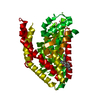 7awlC  7awmC  7awpC  7awqC 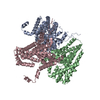 7npwC  5llmS S: Starting model for refinement C: citing same article ( |
|---|---|
| Similar structure data |
- Links
Links
- Assembly
Assembly
| Deposited unit | 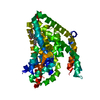
| ||||||||
|---|---|---|---|---|---|---|---|---|---|
| 1 | 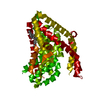
| ||||||||
| Unit cell |
|
- Components
Components
| #1: Protein | Mass: 56512.379 Da / Num. of mol.: 1 Source method: isolated from a genetically manipulated source Details: Rubidium, Barium and UCPH101 bound,Rubidium, Barium and UCPH101 bound,Rubidium, Barium and UCPH101 bound Source: (gene. exp.)  Homo sapiens (human) Homo sapiens (human)Gene: SLC1A3, EAAT1, GLAST, GLAST1, SLC1A5, ASCT2, M7V1, RDR, RDRC Plasmid: pcDNA3.1 / Cell (production host): embrionic / Cell line (production host): HEK-293F / Production host:  Homo sapiens (human) / Tissue (production host): embrionic kidney / References: UniProt: P43003, UniProt: Q15758 Homo sapiens (human) / Tissue (production host): embrionic kidney / References: UniProt: P43003, UniProt: Q15758 | ||||
|---|---|---|---|---|---|
| #2: Chemical | ChemComp-6Z6 / | ||||
| #3: Chemical | | #4: Chemical | ChemComp-RB / | Has ligand of interest | Y | |
-Experimental details
-Experiment
| Experiment | Method:  X-RAY DIFFRACTION / Number of used crystals: 1 X-RAY DIFFRACTION / Number of used crystals: 1 |
|---|
- Sample preparation
Sample preparation
| Crystal | Density Matthews: 3.6 Å3/Da / Density % sol: 65.8 % |
|---|---|
| Crystal grow | Temperature: 277 K / Method: vapor diffusion, hanging drop / pH: 8.2 Details: 30% PEG400, 100 mM Tris pH 8.2, 50 mM Calcium chloride, 50 mM Barium chloride PH range: 8-8.4 |
-Data collection
| Diffraction | Mean temperature: 100 K / Serial crystal experiment: N | ||||||||||||||||||||||||||||||
|---|---|---|---|---|---|---|---|---|---|---|---|---|---|---|---|---|---|---|---|---|---|---|---|---|---|---|---|---|---|---|---|
| Diffraction source | Source:  SYNCHROTRON / Site: SYNCHROTRON / Site:  ESRF ESRF  / Beamline: ID29 / Wavelength: 0.81491 Å / Beamline: ID29 / Wavelength: 0.81491 Å | ||||||||||||||||||||||||||||||
| Detector | Type: DECTRIS PILATUS 6M / Detector: PIXEL / Date: Oct 16, 2016 | ||||||||||||||||||||||||||||||
| Radiation | Monochromator: Channel-cut Si / Protocol: SINGLE WAVELENGTH / Monochromatic (M) / Laue (L): M / Scattering type: x-ray | ||||||||||||||||||||||||||||||
| Radiation wavelength | Wavelength: 0.81491 Å / Relative weight: 1 | ||||||||||||||||||||||||||||||
| Reflection | Resolution: 3.92→46.34 Å / Num. obs: 7276 / % possible obs: 99.6 % / Redundancy: 20.4 % / Biso Wilson estimate: 134 Å2 / CC1/2: 1 / Rmerge(I) obs: 0.118 / Rpim(I) all: 0.027 / Rrim(I) all: 0.121 / Net I/σ(I): 10.9 / Num. measured all: 148478 | ||||||||||||||||||||||||||||||
| Reflection shell | Diffraction-ID: 1
|
-Phasing
| Phasing | Method:  molecular replacement molecular replacement | |||||||||
|---|---|---|---|---|---|---|---|---|---|---|
| Phasing MR | Model details: Phaser MODE: MR_AUTO
|
- Processing
Processing
| Software |
| ||||||||||||||||||||||||||||||||||||||||||||||||||||||||||||||||||||||||||||||||||||||||||||||||||||||||||||
|---|---|---|---|---|---|---|---|---|---|---|---|---|---|---|---|---|---|---|---|---|---|---|---|---|---|---|---|---|---|---|---|---|---|---|---|---|---|---|---|---|---|---|---|---|---|---|---|---|---|---|---|---|---|---|---|---|---|---|---|---|---|---|---|---|---|---|---|---|---|---|---|---|---|---|---|---|---|---|---|---|---|---|---|---|---|---|---|---|---|---|---|---|---|---|---|---|---|---|---|---|---|---|---|---|---|---|---|---|---|
| Refinement | Method to determine structure:  MOLECULAR REPLACEMENT MOLECULAR REPLACEMENTStarting model: 5LLM Resolution: 3.92→21.85 Å / Cor.coef. Fo:Fc: 0.865 / Cor.coef. Fo:Fc free: 0.824 / Cross valid method: THROUGHOUT / σ(F): 0 / SU Rfree Blow DPI: 0.804
| ||||||||||||||||||||||||||||||||||||||||||||||||||||||||||||||||||||||||||||||||||||||||||||||||||||||||||||
| Displacement parameters | Biso max: 275.9 Å2 / Biso mean: 148.16 Å2 / Biso min: 29.17 Å2
| ||||||||||||||||||||||||||||||||||||||||||||||||||||||||||||||||||||||||||||||||||||||||||||||||||||||||||||
| Refine analyze | Luzzati coordinate error obs: 0.63 Å | ||||||||||||||||||||||||||||||||||||||||||||||||||||||||||||||||||||||||||||||||||||||||||||||||||||||||||||
| Refinement step | Cycle: final / Resolution: 3.92→21.85 Å
| ||||||||||||||||||||||||||||||||||||||||||||||||||||||||||||||||||||||||||||||||||||||||||||||||||||||||||||
| Refine LS restraints |
| ||||||||||||||||||||||||||||||||||||||||||||||||||||||||||||||||||||||||||||||||||||||||||||||||||||||||||||
| LS refinement shell | Resolution: 3.92→4.38 Å / Rfactor Rfree error: 0 / Total num. of bins used: 5
| ||||||||||||||||||||||||||||||||||||||||||||||||||||||||||||||||||||||||||||||||||||||||||||||||||||||||||||
| Refinement TLS params. | Method: refined / Origin x: 45.8926 Å / Origin y: -17.8773 Å / Origin z: 0.6181 Å
| ||||||||||||||||||||||||||||||||||||||||||||||||||||||||||||||||||||||||||||||||||||||||||||||||||||||||||||
| Refinement TLS group | Selection details: { A|* } |
 Movie
Movie Controller
Controller




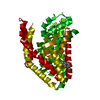

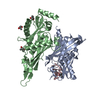
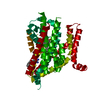

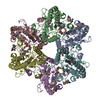
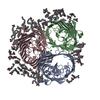
 PDBj
PDBj